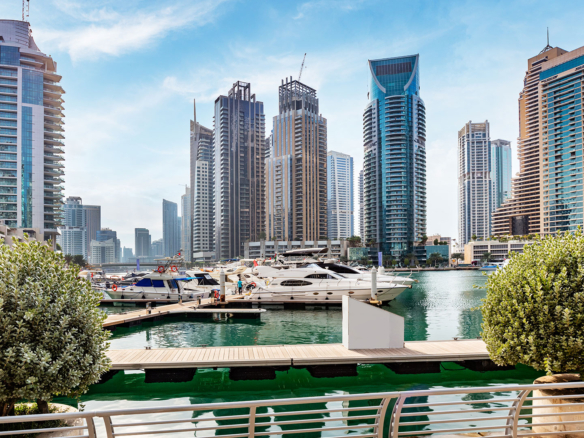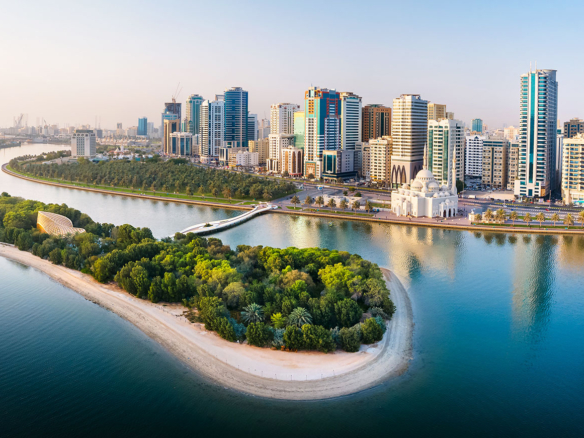UAE entered 2025 with extraordinary real estate momentum especially in Dubai after multiple record-breaking quarters through 2024 and early 2025. Official data from Dubai s media office shows H1-2025 real estate transactions surged 25% by value year-on-year, with AED 326 billion invested by nearly 95,000 investors; notably, 59,000 of them were new to the market. Residents accounted for a meaningful slice of that activity, underscoring that demand is no longer only international hot money.
the same time, credible analysts warn of a potential moderation ahead as new supply ramps up. Fitch Ratings, for example, has flagged the risk of a double-digit price correction into late 2025 2026, driven by a wave of completions after a two-year boom. That doesn t negate the long-term story but it does mean buyers should choose carefully by location, developer strength, and construction timelines.
What s driving demand in 2025
population and policy tailwinds. Dubai s growth agenda (including the D33 plan and the 2040 Urban Master Plan) and pro-business reforms continue to attract founders, professionals, and capital, which translates into leasing and buying. Visa pathways particularly the long-term Golden Visa and straightforward property ownership for foreigners in freehold zones lower friction for relocation and second-home purchases.
Confidence from performance. Early-2025 reports highlight one of the strongest Q1s on record by both volumes and value, led by off-plan sales. The off-plan share matters: it shows buyers are confident committing to projects scheduled for delivery over the next 2 3 years.
Developer capacity building. In response to demand and supply-chain pressures, several top developers have been bringing construction in-house to control timelines and costs. That shift can reduce delivery risk for buyers if executed well though it also concentrates risk at the developer level.
City snapshots: Dubai and Abu Dhabi
Dubai: depth, liquidity, and off-plan leadership. The city remains the UAE s most liquid market, with record activity carried into Q2 2025. Media and brokerage analyses point to unprecedented off-plan volumes (tens of thousands of contracts in a single quarter), robust ready-home resales, and a thick pipeline of 2025 deliveries. For investors, liquidity and transparency are clear advantages exit strategies are easier to execute in liquid sub-markets.
Abu Dhabi: stability with institutional-grade sponsors. The capital city s market is smaller but underpinned by strong public-sector balance sheets and growing non-oil sectors. Flagship developers reported higher sales to overseas and expatriate buyers in 2024, and independent research anticipates supportive macro conditions into 2025 (solid GDP growth, contained inflation). For yield-seekers who want lower volatility, prime Abu Dhabi communities with reputable sponsors merit attention.
Segments to watch
off-plan (pre-construction). Off-plan dominated 2024 and H1-2025. The appeal is clear: staged payments, developer incentives, and access to emerging master-planned districts. The flip side is delivery risk and the possibility of a softer resale market if a lot of similar units hand over simultaneously. Prioritize developers with strong balance sheets, escrow discipline, and a track record of on-time completions. d branded residences. Trophy assets and branded residences benefited from international capital seeking lifestyle, security, and global connectivity. Liquidity is strongest in established prime areas with tight supply; these can cushion downside better if a cyclical cooling emerges. (H1-2025 was still the strongest half on record by volume and value, underscoring the ongoing depth of demand.
Rental market. Leasing demand remains healthy in core employment nodes (near business districts, schools, and transit), but rent growth can diverge by community. When supply completes in clusters, rents can flatten locally even if headline city averages look firm. Cross-check handover schedules for the neighborhoods you re targeting.
Policy & visas: what investors should know
the UAE s Golden Visa allows long-term residency for qualifying investors, entrepreneurs, and professionals. For real estate, rules and minimums can change, but official guidance remains the best source when weighing eligibility and benefits (e.g., longer stays, sponsorship of family, and ease of business setup). Shorter 2-year investor visas via property ownership also exist, generally tied to minimum property values and equity contributions. Always verify the latest thresholds and documentation before committing capital.
How to evaluate opportunities in 2025
Start with fundamentals, not headlines. Record volumes can mask big differences between micro-markets. Compare end-user demand drivers (jobs, schools, amenities), infrastructure plans, and competing supply within a 15 20-minute radius. In Dubai, for instance, liquidity varies widely across communities; choose those with deep resale activity and transparent pricing tracks.
Stress-test against supply risk. Fitch s base case of a potential double-digit price dip reflects the pace of upcoming deliveries. Focus on projects with differentiated product (layout, views, facilities) and limited like-for-like competition at handover. If you re buying off-plan, review escrow safeguards and construction progress reports; if buying ready, study current listings versus historical absorption.
Underwrite realistic yields and costs. Model conservative rents, vacancy, service charges, property management fees, and potential fit-out. In towers with extensive amenities, service charges can materially impact net yield factor them in upfront. Cross-reference upcoming handovers in the same corridor; sudden supply can flatten rents for 12 18 months.
. Prioritize developer quality. Balance sheet strength matters in long cycles. Large UAE names reported strong sales and backlogs into 2025, but project-level dynamics vary; scrutinize each project s phasing, contractor strategy (in-house vs. third-party), and historic delivery timelines.
Plan your exit. Liquidity is your insurance policy. Communities with steady transaction velocity and transparent comps make resales smoother. For off-plan, understand assignment/resale rules before handover; for ready stock, study average days-on-market and price spreads for similar units.
Practical buying routes
Owner-occupiers (residents). If you live and work in the UAE, map your budget to your daily life: commute, schools, and service charges. Consider ready homes for immediate use and mortgage eligibility, or off-plan for staged payments if you can wait through construction.
International investors. Validate visa implications, banking, and mortgage options early. If you re targeting the Golden Visa, confirm property value thresholds, eligible asset types (completed vs. off-plan), and equity requirements directly on government portals or through licensed PROs. Use RERA/DLD tools and developer escrows for due diligence.
Portfolio builders. Diversify by city (Dubai for liquidity, Abu Dhabi for stability), by stage (mix of ready yield and off-plan growth), and by ticket size. Consider student-centric and employment-node micro-markets where tenant demand is structural, not purely speculative.
Risks to watch for this year
- upply bulge in certain corridors at handover can pressure prices and rents short-term.
- onstruction and delivery risk if contractors are overstretched even as developers internalize more work to mitigate it.
- nterest-rate sensitivity for leveraged buyers; while many off-plan plans are equity-based during construction, end-financing costs still matter at handover. (Check your bank s EIBOR-linked terms and stress-test a range of rates.)
- egulatory updates on visas or ownership generally supportive, but always verify the latest before you transact.
A simple action plan for 2025 buyers
- efine your goal first: end-use home, rental yield, or capital growth. Your goal dictates whether you buy ready (certainty, cash flow) or off-plan (staged payments, potential upside).
- hortlist three micro-markets with distinct tenant bases and supply dynamics; collect six months of comps in each.
- ick sponsor quality over brochure gloss, favoring developers with strong backlogs and on-time delivery histories.
- erify visa pathways on official portals before you wire deposits.
- tress-test your exit: could you rent at a conservative rate or resell within 90 days without a steep discount? Use transaction data to guide expectations.
Bottom line
The UAE property market in 2025 combines powerful structural drivers population growth, pro-business policy, and infrastructure with a very real supply cycle. Dubai offers unmatched liquidity and off-plan depth; Abu Dhabi provides steadier, institutionally backed opportunities. If you buy with disciplined underwriting developer quality, micro-market fundamentals, realistic yields, and a clear exit plan you can participate in the UAE s growth story while being prepared for the cyclical bumps that may arrive as new supply completes.
If you want, tell me your budget, target city (Dubai vs. Abu Dhabi), and whether you prefer ready or off-plan I ll map out three specific communities and sample deals that fit your plan.





Join The Discussion